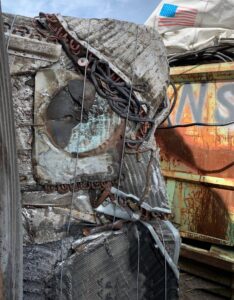 Mark Monroe, associate professor of art at Austin College, will present the motivation and methods behind his exhibit “Industrial Debitage: Artifacts from the Anthropocene” at the 2019-2020 Austin College Bernice S. Melvin Sabbatical Series Lecture on February 26 at 5 p.m. in Dennis Gallery of Forster Art Complex. A reception will precede the lecture at 4:30 p.m. The event is free and open to the public.
Mark Monroe, associate professor of art at Austin College, will present the motivation and methods behind his exhibit “Industrial Debitage: Artifacts from the Anthropocene” at the 2019-2020 Austin College Bernice S. Melvin Sabbatical Series Lecture on February 26 at 5 p.m. in Dennis Gallery of Forster Art Complex. A reception will precede the lecture at 4:30 p.m. The event is free and open to the public.
“Our species has affected the earth so comprehensively that we now occupy our own namesake geologic period,” said Monroe. “Our profusion of ‘stuff,’ which is only made possible by mechanization and industrial scale production, will remain long after we’re gone. What visual elements will remain of the Anthropocene?”
The works in this exhibit are made from cast off materials, detritus, or repurposed objects. They tell the story of the world’s artifacts at this time. This body of work reflects a year of observing, documenting, and working from the Texas landscape.
During academic year 2018-2019, Monroe photographed locations in Texas, including Burnett Ranch, Blanco River, and Wimberley, and the M. Lipsitz & Co. Recycle Center in Waco. He traveled to museums in London, New York City, and Houston and made presentations at “Burning Man” in Nevada; “Meow Wolf” in Santa Fe, New Mexico; “ArtoCade” in Trinidad, Colorado; and the Houston Art Car Parade.
The lecture is presented by the Robert & Joyce Johnson Center for Faculty Development and Excellence in Teaching. Dr. Keith Kisselle, chair of the Environmental Studies Department and associate professor of biology and environmental science, will bring the next Sabbatical Series lecture, “Threats to the Canadian Boreal Forest: My Sabbatical With the Natural Resources Defense Council,” on April 1.
Austin College, a private national liberal arts college located north of Dallas in Sherman, Texas, has earned a reputation for excellence in academic preparation, international study, pre-professional foundations, leadership development, committed faculty, and hands-on, adventurous learning opportunities. One of 40 schools profiled in Loren Pope’s influential book Colleges That Change Lives, Austin College boasts a welcoming community that embraces diversity and individuality, with 46 percent of students identifying as persons of color. The residential student body of approximately 1,300 students and more than 100 expert faculty members allow a 13:1 student-faculty ratio and personalized attention. Founded in 1849, the College is the oldest institution of higher education in Texas operating under original name and charter.


